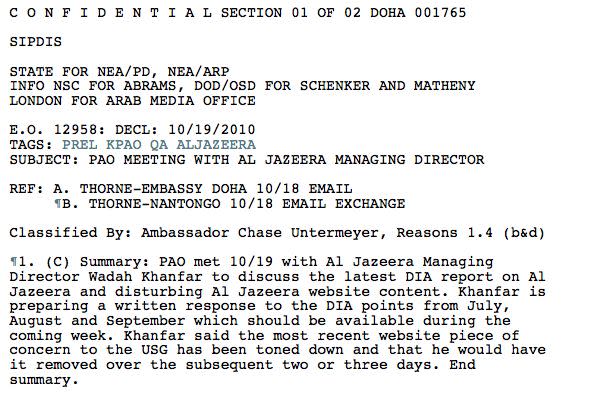 The Cutline
The CutlineAl Jazeera director resigns amid scandal; WikiLeaks cable reveals he met with U.S. intelligence, agreed to remove ‘disturbing’ content

Al Jazeera's longtime managing director Wadah Khanfa announced his resignation on Tuesday amid a scandal unearthed by a diplomatic cable from the U.S. embassy in Doha.
According to the cable published by WikiLeaks, Khanfa met with a U.S. intelligence official to discuss "disturbing Al Jazeera website content." According to the report, Khanfa agreed to delete the content. "Not immediately, because that would be talked about, but over two or three days," Khanfa said, according to the cable.
In a lengthy memo emailed to staffers announcing his resignation, Khanfa made no mention of the meeting.
"This month marks my eighth year at the helm of Al Jazeera," he wrote. "Having served as the organisations top executive since 2003, first as Managing Director and then as Director-General, I have decided to move on."
"For sometime [sic] I have been discussing my desire to step down with the Chairman of the Board," Khanfa continued. "He has kindly expressed understanding and has accepted my decision."
The announcement of Khanfa's departure on Al Jazeera's website makes no mention of the WikiLeaks controversy, either.
On Tuesday, the Qatar-funded network named Sheik Ahmad bin Jasem bin Muhammad Al-Thani, a member of the Qatar royal family, to replace Khanfa.
A representative for Al Jazeera did not immediately respond to a Cutline request for additional comment.
Khanfa, who is widely credited with transforming the Arab media landscape, wasn't shy about saying so.
"Through your hard work and persistence, often in times of great adversity, we now reach millions of viewers across the world," a defiant Khanfa wrote. "This includes inroads into the most competitive media market in the world, the United States of America. This was no easy feat--not long ago, then US Secretary of Defense Donald Rumsfeld unfairly attacked our coverage of Iraq while today, US Secretary of State, Hillary Clinton, hails our news coverage. We were not weakened by Rumsfeld's comments nor made complacent by Clinton's . . . . Our independent and integral coverage has not changed."
"When we launched in 1996 'media independence' was a contradiction in terms," he added. "State media was prevalent and was blatantly used for propaganda and misinformation. Within such an environment the public probably doubted that Al Jazeera would fulfill its promise of independent journalism. We managed to pleasantly surprise them by exceeding all expectations."
